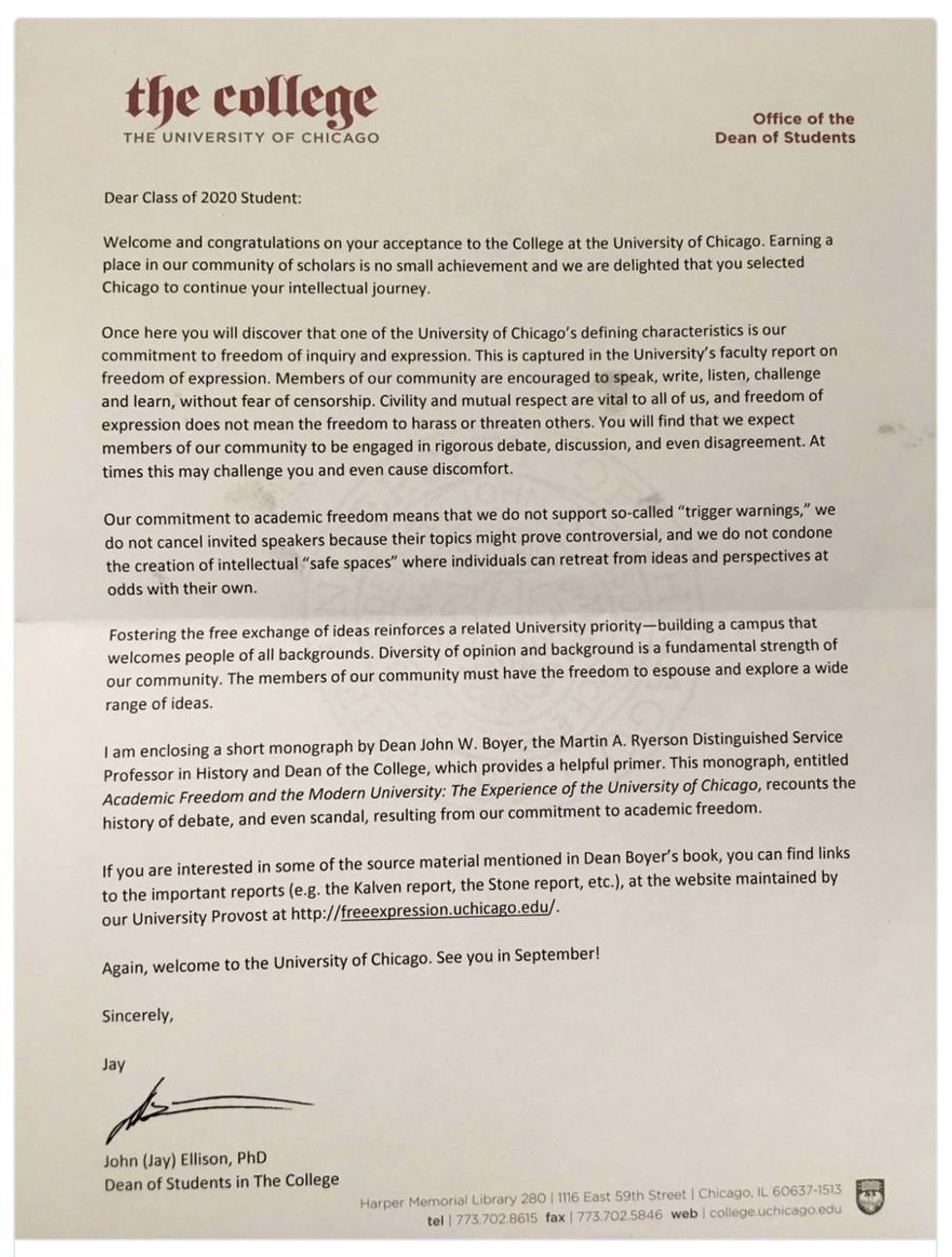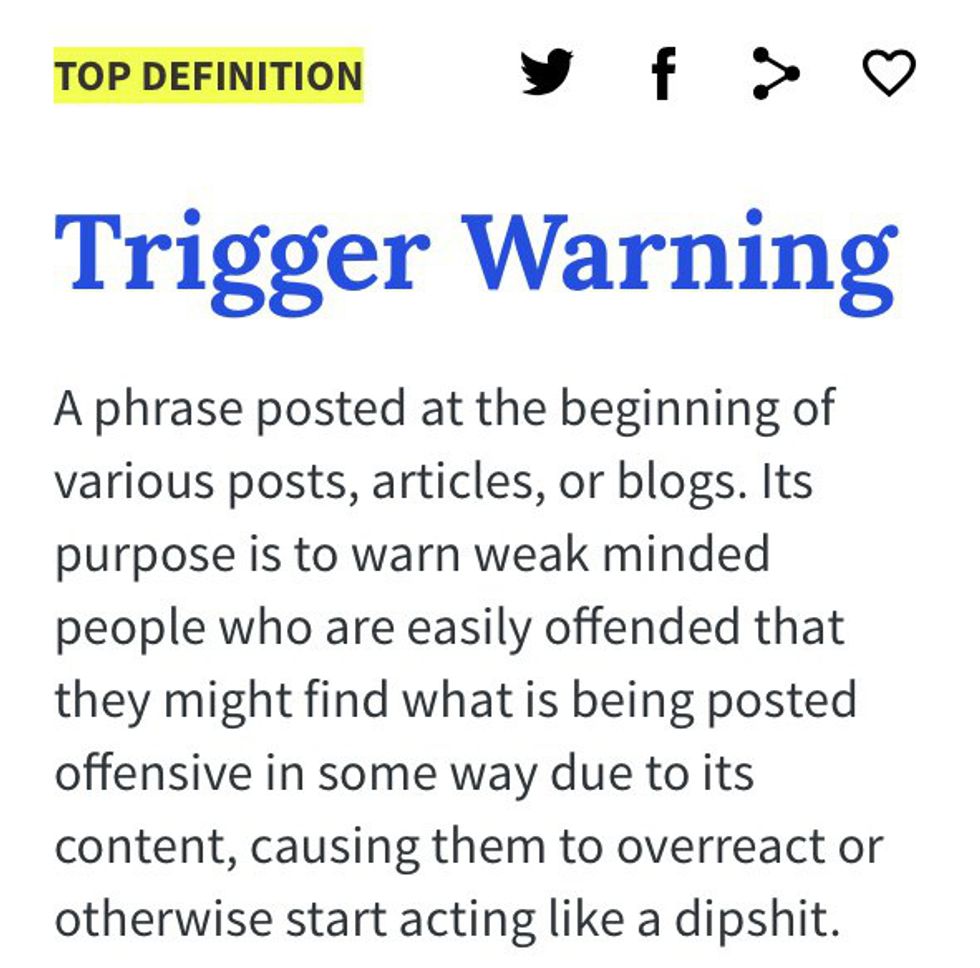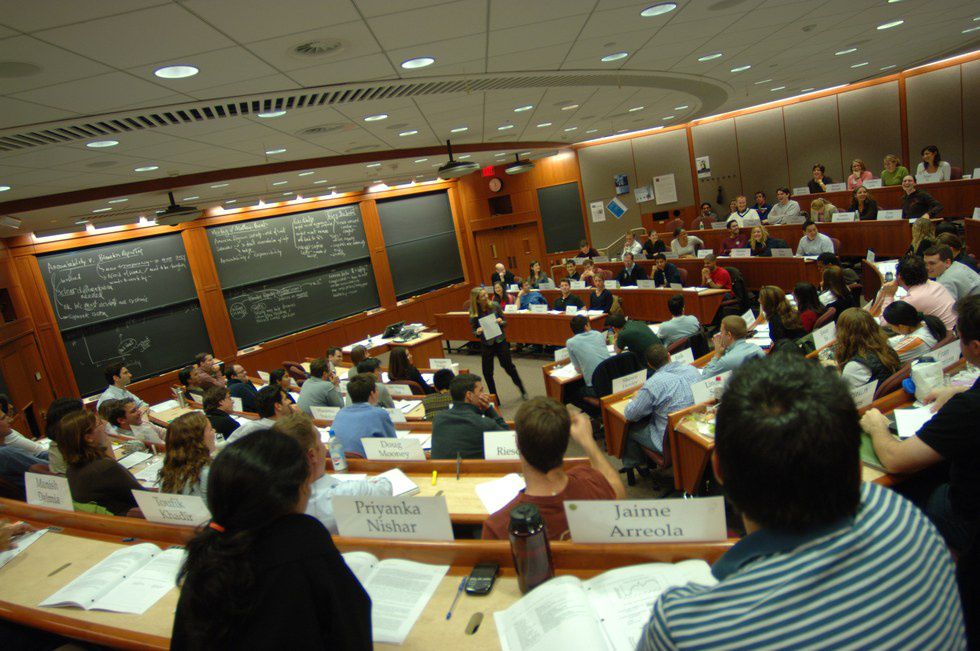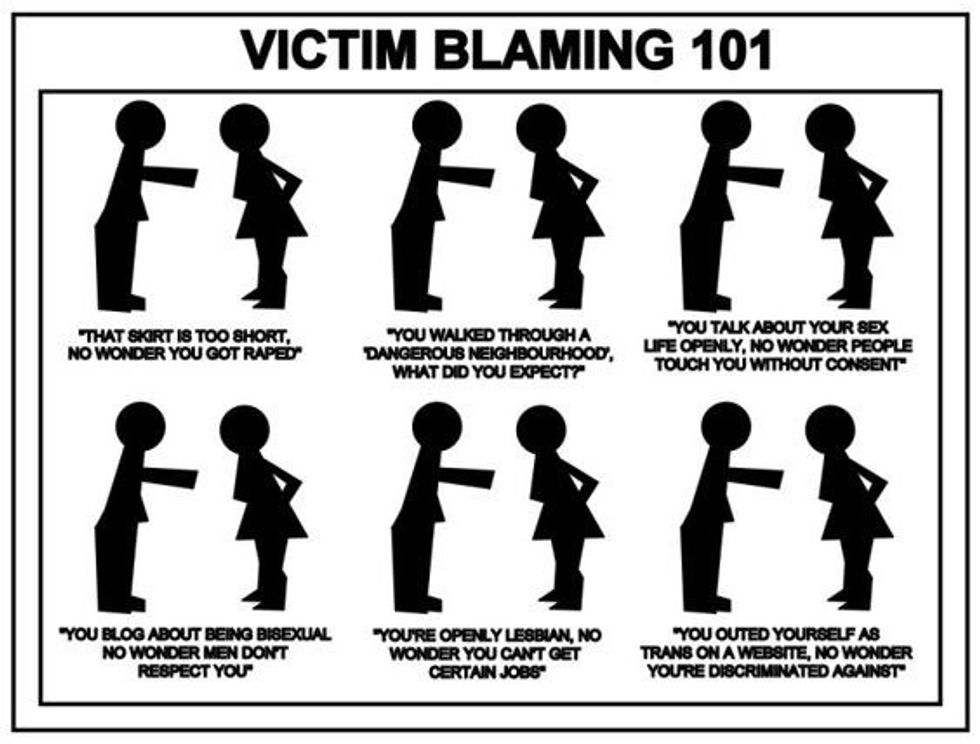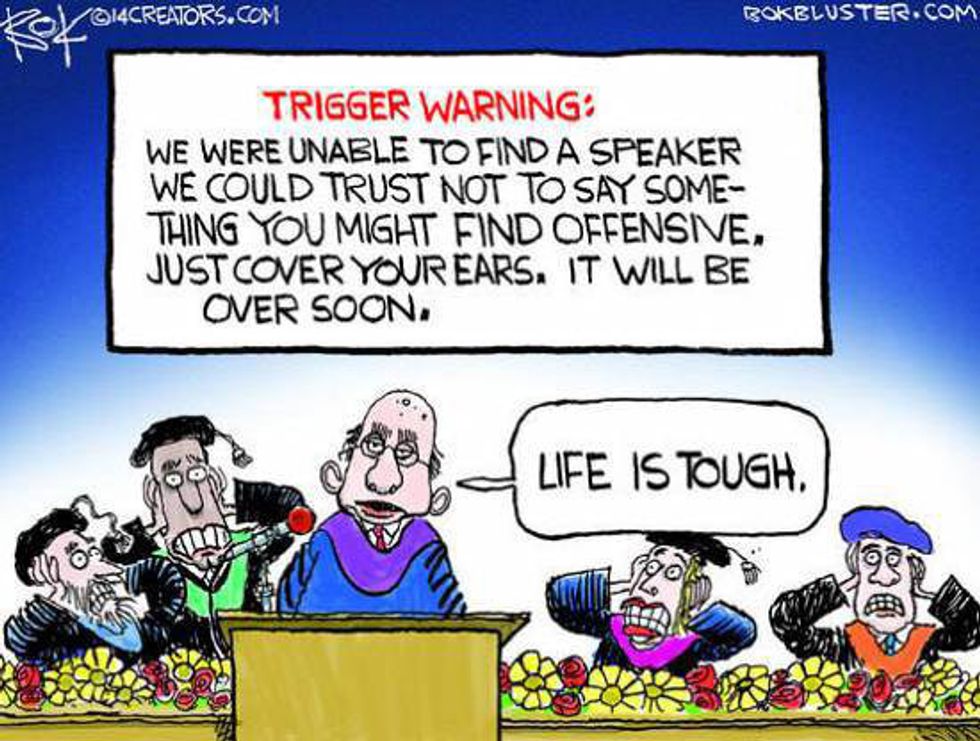As many of you have probably heard, the University of Chicago recently sent out a welcome letter to its Class of 2020 in which the Dean of Students, John Ellison, made quite a few controversial statements. In an effort to back UChicago's "commitment to academic freedom," Dean Ellison wrote, "we do not support so-called 'trigger warnings,' we do not cancel invited speakers because their topics might prove controversial, and we do not condone the creation of intellectual 'safe spaces' where individuals can retreat from ideas and perspectives at odds with their own."
Before I go on, let me make it clear that I fully support free speech. I support uncomfortable speech. I support and completely agree with the notion that academic freedom and open discourse is critical, and that college is a place where one should be confronted with new and differing ideas.
However, I do not support the sentiments of UChicago in condemning trigger warnings and safe spaces, or grouping them with "controversial speakers," and find this letter to be problematic for a number of reasons.
Trigger warnings simply do not threaten academic freedom.
It's almost funny that Dean Ellison goes on to write that "the free exchange of ideas" (and therefore not using trigger warnings and safe spaces) "reinforces another university priority — building a campus that welcomes people of all backgrounds," because the very reason for using trigger warnings in the classroom is to accommodate and acknowledge the needs of certain students, such as those with backgrounds that include trauma. I'm therefore led to believe that the UChicago administration, unfortunately like many people in this conversation, just does not understand the fundamental meaning of the term "trigger warning." Instead of well-thought out and researched ideas founded upon what is truly best for students and the university setting, it seems that the letter was "based on [a] false narrative of coddled millennials,” as the student body president at UChicago, Eric Holmberg, voiced—a narrative that is improperly played open far too often. In fact, if you search for the definition of trigger warnings on Urban Dictionary, the top result is as follows:
At best, this definition, like UChicago's letter, exemplifies the far too common misconception that trigger warnings are for people who do not want to listen to different ideas, rather than those who have some kind of personal history with the material; at worst, it suggests that rape, abuse, and other trauma survivors are “weak minded” for being emotionally impacted by their experience. By terming those who need trigger warnings as “easily offended,” this definition proposes that trigger warnings are primarily for ideologically offensive material, rather than truly upsetting content that can cause extreme distress for some—thereby lacking the same understanding as the UChicago letter.
If you Google the exact definition of the term, you will see that a trigger warning is "a statement at the start of a piece of writing, video, etc., alerting the reader or viewer to the fact that it contains potentially distressing material (often used to introduce a description of such content)." Most commonly now, trigger warnings are used when material relates to sexual assault, abuse, or other such forms of violence, and most often occur in the form of professors taking quite literally just a few seconds to mention that such material is coming up. The point of providing this type of heads up is so that anyone in the room who has been affected by the issue in question in the past can either mentally and/or emotionally prepare themselves for the upcoming material, or, if they really need to, excuse themselves temporarily. PTSD is not at all uncommon amongst survivors of sexual violence or other experiences that can result in triggers, and just as, for example, fireworks can cause soldiers to have distressing flashbacks or other severe emotional or physical reactions, so can certain material for other types of survivors.
So, UChicago, please tell me how taking a few seconds to alert people of distressing material limits freedom of speech. The material will still be covered, and it's simply giving those who may need it a moment to prepare themselves for it mentally. Using the example of content relating to sexual violence, we are in a time when one in four to one in five college women are sexually assaulted, so there is nearly a statistical guarantee that there are at least a few people in almost every classroom who could be triggered by sudden or graphic material relating to the topic. How does acknowledging their needs threaten academic freedom? Sure, trigger warnings are abused at times, but when used properly (which is a significant amount of the time) trigger warnings can actually help full learning because if someone is suddenly confronted by a trigger and it causes undue distress, they certainly will not gain as much as they should from the lesson, nor will they contribute to the conversation if they are fighting off flashbacks, an anxiety attack, or any other symptoms that the trigger may cause.
Trigger warnings allow more people to be a part of the conversation and therefore ensure that academic freedom is more inclusive, contrary to UChicago’s argument.
I would argue the same for intellectual safe spaces—rather than impeding discourse, intellectual safe spaces support it, and I would also once again say that UChicago lacks a true understanding of what those spaces really are. A friend of mine has a Constitutional law course that is run as a safe space, and that just means that any student can make any comment without having to worry about being attacked by someone else for it. Now, that does not at all mean that opposition is silenced or that students "can retreat from ideas and perspectives at odds with their own," as Dean Ellison suggested. All it means is that opposition must be articulated respectfully, rather than violently—and I also think that those are values not specifically embedded in safe spaces, but rather just in generally being a decent human being. In that way, discourse is actually promoted, because students are more likely to voice their true thoughts and ideas when they are comfortable and can engage in productive, respectful conversation rather than volunteer themselves for being attacked or shamed for their views. As the President of Northwestern University says,
"I’m [not] an economist, not a sociologist or psychologist, but those experts tell me that students don’t fully embrace uncomfortable learning unless they are themselves comfortable. Safe spaces provide that comfort. The irony, it seems, is that the best hope we have of creating an inclusive community is to first create spaces where members of each group feel safe."
Yes, it is true that in the "real world" not everyone is going to make the effort to be decent and respectful in their opposition or criticism, but for the purpose of a more complete and engaged education, safe spaces have proven effective as stated above, and condemning them does not truly address the issue anyway. Alcoholics Anonymous is a safe space. Support groups for marginalized groups like people of color or those in the LGBTQIA+ community are safe spaces. Support groups for rape survivors are safe spaces. Each of these spaces either allows people to become more comfortable with their identities, openly discuss issues relating to their identities, or work through their experiences in the case of survivor support groups or AA. It is difficult to argue that any one of the groups I just mentioned is detrimental to society or freedom of speech without being against supporting those with different backgrounds or experiences.
One Twitter user supports UChicago by arguing that "if you are so damaged [that you] can't handle abstract discussion of issues, you don't belong in college," and others have spouted similar defenses. If this is one of the primary arguments backing UChicago, then that only highlights how problematic their letter is. The Twitter statement not only suggests that it is the fault of the survivor of whatever "damaging experience" that it happened to her or him, but also that the consequent emotional effects are also their fault, and that they shouldn't be in college or the real world if they're not "strong enough" to ignore those effects.
In a time when colleges and universities are under heavy criticism for not adequately addressing sexual assault on their campuses and for not supporting survivors, I'm sure that is not the message UChicago wants to be sending right now. Their letter, however, suggests that students with some form of trauma-based mental illness are an inconvenience, discomfort, and obstacle in the classroom. This lack of understanding in regards to what trigger warnings, when used properly, actually are is far too common.
It is also worth noting, for those who argue that the “real world” is not sugar-coated in trigger warnings, that movies and other forms of media are required to have advisories denoting any extreme or graphic violence, or other potentially distressing content.
To me, it sounds like UChicago is grouping controversial speakers and triggering material together because both could be upsetting to some students, but the huge factor that they are missing is that the two are upsetting in completing different ways. Controversial speakers could cause discomfort to some people if they personally have a strongly-held opposing opinion, which is why I agree such speakers certainly should be protected— hearing other opinions is critical, and simply having opposing personal beliefs doesn't merit being allowed to separate yourself from all differing opinions. On the other hand, triggering material can be heavily upsetting to certain people because they have been through something traumatic related to that content, or could otherwise be truly, deeply emotionally disturbed by it—which is not at all the same thing as just having a different opinion or being offended by someone else's views and therefore not wanting to listen to something controversial.
There is so much room for discussion on the topics of trigger warnings and safe spaces, and so many critical questions that have yet to be adequately discussed—how to determine what should and shouldn't be preceded by a trigger warning, how to determine when and what to do if trigger warnings or safe spaces are being abused, what do when the central topic of a class is related to a common trigger, how to enforce intellectual safe spaces while keeping the setting realistic, how to address issues between students and teachers when problems related to triggering material arise, etc.—but by framing safe spaces and trigger warnings as an over-simplified assault on freedom of speech, UChicago is discouraging true, productive discourse on the topic. Quite ironic, I would say.
As former UChicago professor Andrew Dombrowski says in regards to the:
"I’m very disappointed in the letter, because one of the [basic principles of good intellectual] practice that I learned at UChicago is to engage with the strongest reasonable form of an argument you’re opposed to, not to snarkily set up a straw-man argument in hopes that it will go viral (and let’s not kid ourselves, this was done with an eye to the outside world and external publicity). That’s what really bothers me here; I'm less invested in the ultimate policy decision and more profoundly disappointed by the lack of intellectual rigor and honesty involved in failing to reckon with the other side."
I truly do applaud UChicago's efforts to preserve freedom of speech and academic discourse. That said, I do think that they are going about it the wrong direction. They inaccurately group controversial speakers (who I support) with trigger warnings and safe spaces which, when used correctly, are near-effortless gestures aimed at acknowledging potentially distressing situations to ensure that all students are comfortable and able to contribute—which is exactly what is needed for free discourse. Instead of playing upon the narrative of over-sensitive millennials whining to be wrapped in some kind of bubble-wrapped protection, I hope UChicago and all other colleges and universities support legitimate discussion on these topics and go about protecting academic freedom in a more productive and effective way.




